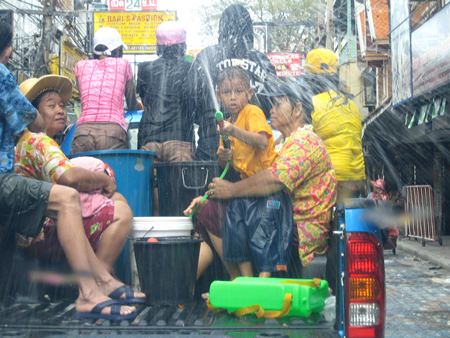I am not looking forward to Songkran. In fact, I dislike Songkran. If it were one day it would be fun, but days of being soaked, is not. However, there is no getting away from the fact that Songkran is a festival you should photograph – even if it is only once! I will also admit that the first time I experienced this annual water throwing event, I too thought it was fun.
By the way, despite what you may be told, this is not a uniquely ‘Thai’ festival, but one that is celebrated in many countries in SE Asia, hence those who would like to flee must go further than the immediate neighboring countries!

As a visual spectacle it is definitely worth recording for posterity, but this should not be done at the expense of your camera equipment. As mentioned, this is a water festival, and cameras and thrown water (and powder and ice) do not mix. (For that matter, water throwing and alcohol do not mix either, which is just one of the reasons for the horrendous death toll.)
Since great volumes of water will be thrown (despite the fact that Thailand is always in the throes of a drought) this does offer some great photo opportunities, but unfortunately also presents some great opportunities to permanently damage your expensive camera gear.
There are several ways around this problem. The first is to go all out and buy a Nikonos underwater camera at the cost of many thousands of baht. This is a wonderful underwater camera but for this instance – totally impractical, unless you want to stand at the side of the road in a full wet-suit!
The second way is to purchase a fancy plastic underwater housing for your own camera. Now these can range in price, depending on complexity. Built like a perspex box to house your camera, you can operate all the adjustments from the outside. These are not cheap either, and the cheapest in the range is literally a plastic bag with a waterproof opening and a clear plastic section for the lens. You open it up and literally drop your camera inside it and seal the bag. These can be purchased from major photographic outlets and I did spot one in a photo shop for B. 750.
A third way is a waterproof disposable (yes, they do make them). Good for about three meters, so perfectly suitable for splashing water. If you can’t get one of those, then even the ordinary cheap disposables are a better option than getting your good camera gear doused. I must admit to having dropped one of these overboard one day and the boatman jumped in and rescued it. It survived the dip and the final pictures were fine. But neither I, nor the manufacturer, recommend this!
So now let’s get down to some serious photo techniques to get that magic Songkran shot. Since you are trying to capture the movement of the water, a slow shutter speed will help. Hand-held you are probably not going to get down below 1/30th, but you could try some at 1/15th, it’s not impossible, especially if you are using a wide-angle lens.
However, since you are trying to get far enough away to keep the camera dry, you may be forced to use the longer lenses which means you cannot hand-hold at even 1/30th. The answer here is to find a good vantage point, some distance from the action, and use a tripod.
If you are going down this route, then the best vantage point is a high one. First floor balconies get you high enough to escape the water, but not too high that you cannot get into the activity with a 150 mm lens or longer. Since you will be using a tripod, I would even set the shutter speed slower than 1/30th, and a few ‘experimental’ shots at 1/8th or even 1/4 of a second are worth trying. Remember that some ‘blurring’ denotes motion, and at Songkran there is plenty of activity.
Finally, you can always cheat by photographing through the windscreen of the car, as I did with this week’s photo! “Chok di bi mai! May your camera stay dry!”




